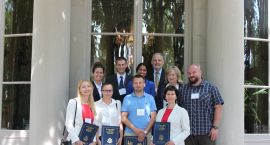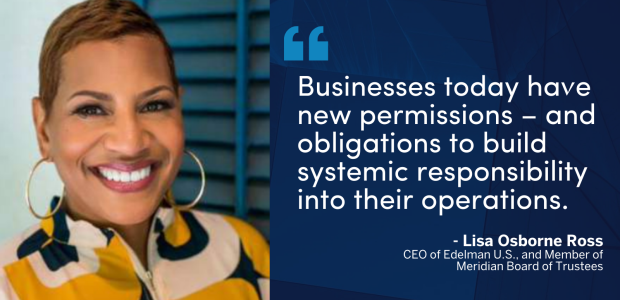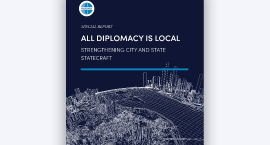The following was written by Lisa Osborne Ross, CEO of Edelman U.S. and member of Meridian Board of Trustees. This feature can be found in our recently launched Corporate Systemic Responsibility Report which was the first outcome of our new Responsible Business Diplomacy initiative. T To download the report and read other testimonies, click here.
I am an optimist, and that position has at times felt hard to maintain throughout 2020 and 2021. Over the past 18 months, our society has weathered challenges that, imagined five years ago, would have crushed our spirits in mere anticipation. But, for those seeking a silver lining, consider this: We may be divided and fractured, but we have not forsaken one another.
In fact, Edelman’s Trust Barometer suggests that people are more likely now than ever to look out for one another and for our global society. They’re also more likely to hold the private sector accountable for building a better world for all – whether it’s in the brands they choose to buy, the leaders they choose to follow, or the companies they choose to work for.
The Trust Barometer has emphasized the role of business in building a better world for over a decade. What’s different now is the accountability that our private sector leaders feel – an accountability posed by a more value-driven, more activist society. There are growing pains in this, to be sure. But there is also immense potential.
The future of business is one that reflects a clearer model of public leadership – a model that’s truly co-created and society-first. In my work advising CEOs and boardrooms, one thing I often say is, “What got you here won’t get you there.” The attributes of the modern chief executive look and feel different than they did five years ago.
The new CEO is a societal leader, not simply a P&L manager. She must engage in a more democratic “campaign trail” – a commitment to hearing the voices of employees, customers, and suppliers, ensuring genuine representation and inclusion of all people and ideas. Today’s CEO must recast herself as a social visionary, committed to dismantling unjust or unserviceable systems and building better ones in their place. She must espouse a true commitment to impact, sacrificing profit in exchange for solutions to our global challenges when necessary. And critically, she must build this sensibility into the entirety of her operations, ensuring that big, purpose-led commitments don’t fall apart in the day-to-day tactics of stakeholder management, Board room debates, and financial goals.
The years of CSR as a check-the-box exercise or a fluffy addendum to an annual report are gone – the past 18 months have left us with that legacy. Greenwashing, spin, and profit without principle are out – for good. Bold action, two-way dialogue, and public commitment are in – for the better. Businesses today have new permissions – and obligations – to build systemic responsibility into their operations. For those who lead them, it’s an opportunity that must not be lost.
















